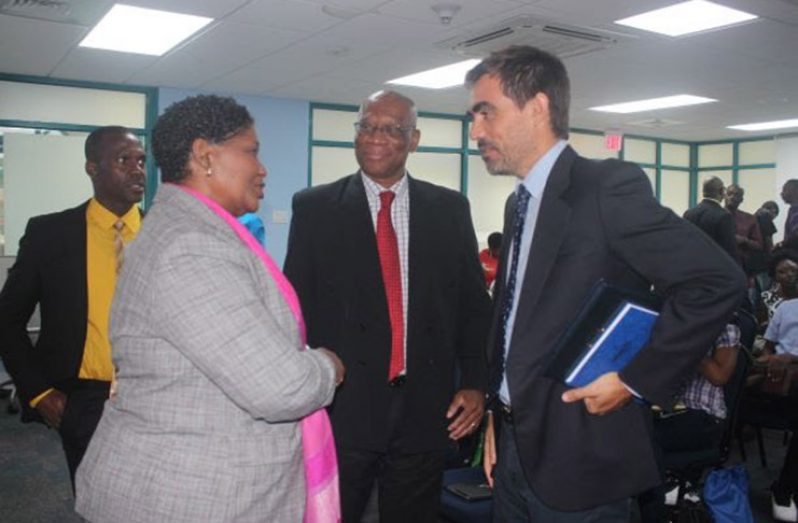-CARICOM workshop told
SOCIAL and economic empowerment of youths across the Caribbean can significantly reduce the prevalence of crime in the Region, CARICOM leaders said during the opening of a capacity-building workshop in Barbados.
Recent studies show that the majority of victims, as well as perpetrators recorded by the police are young males between 18 to 35 years old, while 80 per cent of prosecuted crimes were committed by youth 19 – 29 years old, in the Caribbean. The high youth unemployment rate in the Region is among the socio-economic determinants of crime but it is believed that through programmes such as the CARICOM “homegrown” Creative Entrepreneurship Business Opportunity (CEBO) programme, there can be a steep reduction in crime in the Region.
The capacity-building workshop, which marked the official closing of the Crime and Violence Component of the EU-funded CARIFORUM Crime and Security Programme, is using the CEBO model to boost the capacity of 30 youth, including those who are characterised as ‘at risk’.
CARICOM Secretariat, Director, Human and Social Development, Helen Royer, said the workshop was one of a number of activities of the Crime and Violence Component.
“The focus was on building sustainability within Member States through focused capacity-building, development of data collection platforms and assessments of the risks and resiliency factors that contribute to or reduce the involvement of key populations in crime and violence,” Royer explained during the opening of the workshop on Monday.
She noted that throughout the Crime and Violence Component of the CARIFORUM Crime and Security Programme, major emphasis was placed on the Region’s youth who are represented as both the main perpetrators and victims of criminality. Royer said it was critical for capacity to be built to ensure that institutional responses to crime and violence were developed from a prevention perspective.
Added to that, she acknowledged the important role of the EU in facilitating the programme, which addressed the socio-economic and institutional conditions that have fostered organised crime and criminality, while also providing viable choices and alternatives to criminal activities.
“Your [EU] concerted efforts and contribution is a sign of your commitment to addressing the problem of crime and violence especially among our youth,” the director said.
EU Representative, Felipe de La Mota, Team Leader, Regional Cooperation and Trade Support, in his remarks, said that the EU believes in a commonsense approach to protecting public safety moving.
“We prefer a model which does not simply warehouse offenders and take the more difficult approach and try to address the underlying causes of crime; an approach that is aimed at closing the revolving doors of recidivism. We know that spending money up front would save money down the line,” he added.
He explained that the crime problem could not be seen as just a law enforcement issue. “It is about poverty, unemployment, social inclusion and education,” he said, and added that the EU’s support to the Caribbean to help reform the security and justice sectors had not ended with these programmes.
Meanwhile, Barbados’ Director for Youth in the Ministry of Culture, Sports and Youth, Cleviston Hunte, in his address, touched on the issue of inequality, especially among youth whom he said remained the “most vulnerable in our society.”
The Director pointed out that in the Barbados’ Youth Policy, unemployment was the first area of concern for young people, followed by crime and violence. He noted that training opportunity is among other initiatives that would support Barbados’ Economic Recovery Strategy by “producing a cadre of young people with the knowledge skills and ability to conceptualise and start viable and sustainable enterprises in any of the creative disciplines…”
“The exposure to the training will definitely add value to this country” given that there would be an increased number of persons with skills and the capacity to have businesses within their communities that would drive economic activities from the grass root level and inspire peers to duplicate their actions, he added.
Funded under the Tenth European Development Fund, the CARIFORUM Crime and Security Programme has three components: drug demand and supply reduction; crime and violence prevention and social development; and capacity building of law enforcement and security agencies and enhanced cooperation with Third States.
Its overall objective is to contribute to the overall safety of citizens and improvement of the security environment in the CARIFORUM Region.


.jpg)











